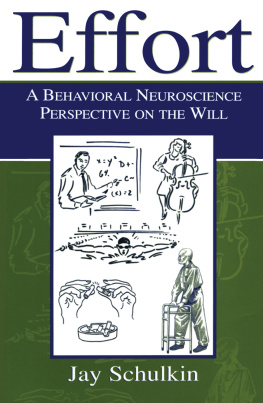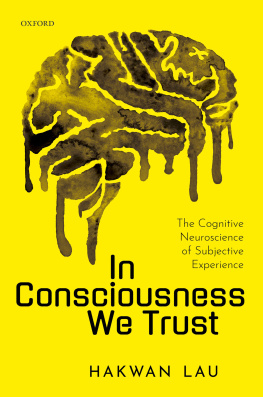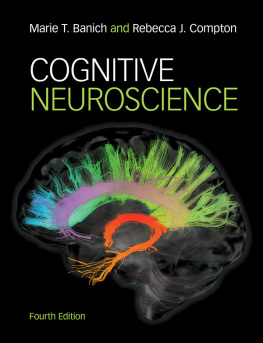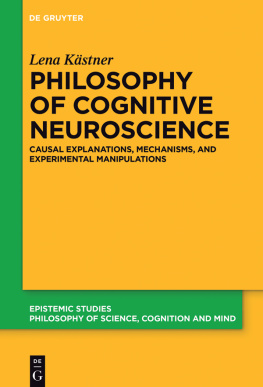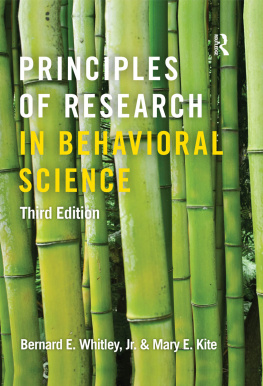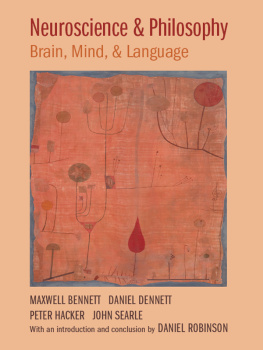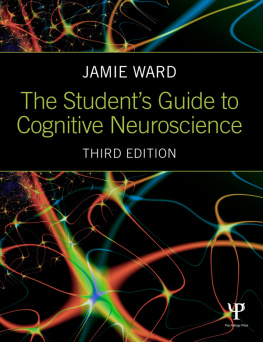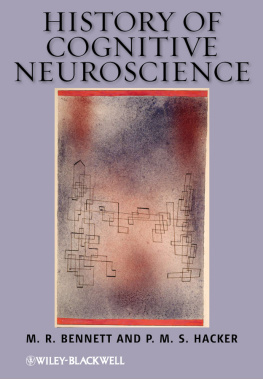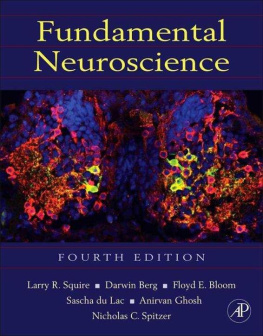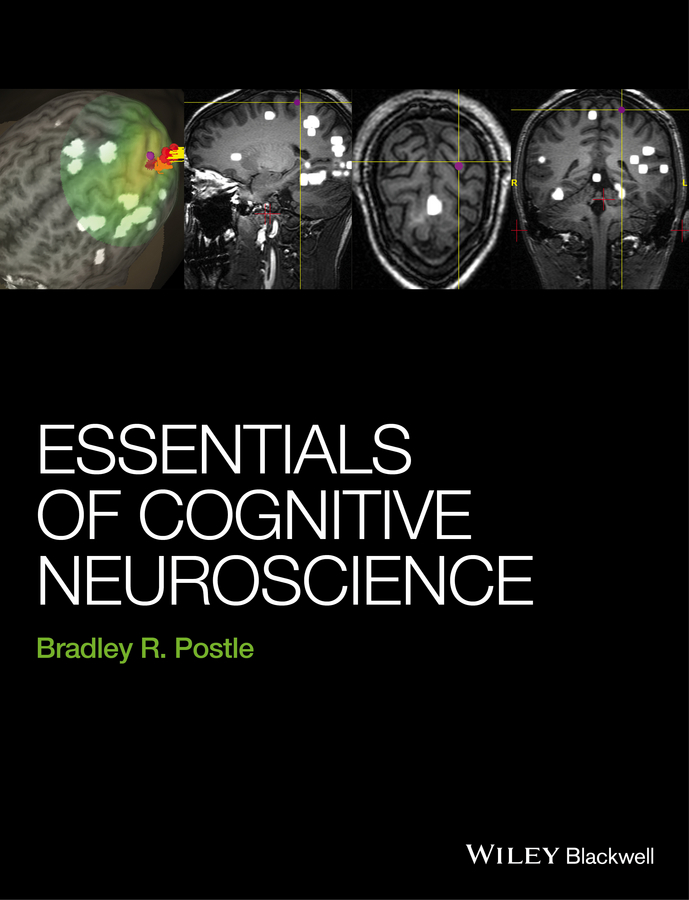
CONTENTS
List of Tables
- Chapter 12
List of Illustrations
- Chapter 01
- Chapter 02
- Chapter 03
- Chapter 04
- Chapter 05
- Chapter 06
- Chapter 07
- Chapter 08
- Chapter 09
- Chapter 10
- Chapter 11
- Chapter 12
- Chapter 13
- Chapter 14
- Chapter 15
- Chapter 16
- Chapter 17
- Chapter 18
- Chapter 19
Guide
Pages

ESSENTIALS OF COGNITIVE NEUROSCIENCE
Bradley R. Postle
This edition first published 2015
2015 John Wiley & Sons, Ltd.
Registered Office
John Wiley & Sons, Ltd, The Atrium, Southern Gate, Chichester, West Sussex, PO19 8SQ, UK
Editorial Offices
350 Main Street, Malden, MA 02148-5020, USA
9600 Garsington Road, Oxford, OX4 2DQ, UK
The Atrium, Southern Gate, Chichester, West Sussex, PO19 8SQ, UK
For details of our global editorial offices, for customer services, and for information about how to apply for permission to reuse the copyright material in this book please see our website at www.wiley.com/wiley-blackwell.
The right of Bradley R. Postle to be identified as the author of this work has been asserted in accordance with the UK Copyright, Designs and Patents Act 1988.
All rights reserved. No part of this publication may be reproduced, stored in a retrieval system, or transmitted, in any form or by any means, electronic, mechanical, photocopying, recording or otherwise, except as permitted by the UK Copyright, Designs and Patents Act 1988, without the prior permission of the publisher.
Wiley also publishes its books in a variety of electronic formats. Some content that appears in print may not be available in electronic books.
Designations used by companies to distinguish their products are often claimed as trademarks. All brand names and product names used in this book are trade names, service marks, trademarks or registered trademarks of their respective owners. The publisher is not associated with any product or vendor mentioned in this book.
Limit of Liability/Disclaimer of Warranty: While the publisher and author have used their best efforts in preparing this book, they make no representations or warranties with respect to the accuracy or completeness of the contents of this book and specifically disclaim any implied warranties of merchantability or fitness for a particular purpose. It is sold on the understanding that the publisher is not engaged in rendering professional services and neither the publisher nor the author shall be liable for damages arising herefrom. If professional advice or other expert assistance is required, the services of a competent professional should be sought.
Library of Congress Cataloging-in-Publication Data
Postle, Bradley R.
Essentials of cognitive neuroscience / Bradley R. Postle.
pages cm
Includes bibliographical references and index.
ISBN 978-1-118-46806-7 (pbk.)
1. Cognitive neuroscienceTextbooks.2. Clinical neuropsychologyTextbooks.I. Title.
QP360.P675 2015
612.8233dc23
2014040543
A catalogue record for this book is available from the British Library.
Cover image: Images from an experiment in which repetitive transcranial magnetic stimulation (rTMS) was delivered to targeted regions of the brain while the subject performed a working memory task. White blobs correspond to elevated activity measured in a previous scan, and the purple dot in each image to the rTMS target. These images were acquired during the study published as Postle, Bradley R., Fabio Ferrarelli, Massihullah Hamidi, Eva Feredoes, Marcello Massimini, Michael Peterson, Andrew Alexander, and Giulio Tononi. 2006. Repetitive Transcranial Magnetic Stimulation Dissociates Working Memory Manipulation from Retention Functions in Prefrontal, but not Posterior Parietal, Cortex. Journal of Cognitive Neuroscience 18: 17121722.
PREFACE
Does the world need another cognitive neuroscience textbook? Well, need is such a loaded word What Ill try to do here is summarize my motivation for writing this book and, in the process, convey the pedagogical vision behind choices about style, content, and organization.
For over 10 years I have taught cognitive neuroscience to undergraduate students and to graduate students at the University of Wisconsin-Madison. For undergraduates I offer an upper-level seminar that is linked to a large-enrollment lecture course on cognitive psychology. The lecture course is a survey of cognitive psychology, spanning sensation and perception to decision making, language, and consciousness. The upper-level seminar course, the impetus for this book, is populated by 1215 honors students who are concurrently enrolled in the lecture course. In the seminar, which meets once per week for 75 minutes, we discuss the cognitive neuroscience of whats been covered in that weeks cognitive psychology lectures. The modal student in this seminar has a background in experimental design and probability and statistics for experimental psychology; only some have any formal training in biology, and fewer still in neuroscience. In this context, I have found that a textbook that attempts to cover everything that we know in the field is not effective it will either be too superficial in its coverage to support substantive discussions in class, or it will be inappropriately lengthy and dense, a cognitive neuroscience analogue of the >1000-page medical-school neuroscience textbook that I lugged around as a graduate student in systems neuroscience. Another approach, which is to assign papers from the primary literature, has proven to be an unsatisfactory alternative, because it results in an inordinate amount of class time being taken up with the remedial work of filling in background that the assigned papers dont cover, and explaining methods so that students can fully understand how the experiments were performed and how their results can be interpreted.
Essentials of Cognitive Neuroscience aspires to be a textbook that will support high-level, substantive engagement with the material in settings where contact hours and/or expectations for outside-of-the-classroom preparation time may be constrained. It introduces and explicates key principles and concepts in cognitive neuroscience in such a way that the reader will be equipped to critically evaluate the ever-growing body of findings that the field is generating. For some students this knowledge will be needed for subsequent formal study, and for all readers it will be needed to evaluate and interpret reports about cognitive neuroscience research that make their way daily into the news media and popular culture. The book seeks to do so in a style that will give the student a sense of what its like to be a cognitive neuroscientist: when confronted with a problem, how does one proceed? How does one read and interpret research thats outside of ones sub-area of specialization? How do two scientists advancing mutually incompatible models interrelate? Most importantly, what does it feel like to partake in the wonder and excitement of this most dynamic and fundamental of sciences?
To translate these aspirations into a book, I have made the following pedagogical and organizational choices:
Next page

